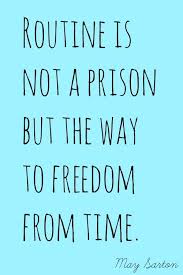Routines are GOOD
- anntonettedailey

- May 8, 2016
- 3 min read
Yes, being flexible to adjust and change is good. But flexibility can still occur in a routine.

Often people ask why others always seem to get stuff done, always seem to be at events and activities, always know what is going on, well read and up-to-date on politics and news. One of the important reasons is that they have routines.
A routine provides freedom.
Think about it – having a routine in the morning ensures that you know what time you have to be out of bed in order to be dressed (showered, teeth brushed etc) with breakfast and maybe a morning coffee with the news. You have a process that you do without having to plan it that gives you the best start for the day. In comparison, no routine means haphazard times of waking, sometimes not getting breakfast, not always getting everything done in the morning to set you up.
I am a fan of routines. Not the routines that provide zero flexibility or control large portions of your day, but those that ensure you get the normal day-to-day activities done efficiently and effectively.
Where I think routines should be put in place:
Morning – it is so important that each day starts well as it can impact how effective you are for the rest of the day. Starting the day looking your best, healthy full tummy and refreshed is essential. Having a regular time you are out of bed and a process to get out the door means less time is wasted doing ‘normal’ things. Of course, do that on the weekend, but during the working week – set a routine and stick to it, to the point where it comes naturally to you.
Key chores: shopping and cleaning. Set a routine that ensures that these occur regularly and at the right times. Shopping may need to be coordinated around pay cycles, linked in with time set for meal preparation and family activities such as night sport activities. Same goes for cleaning, having a routine of either doing 30min every day or a big clean once a week – either way, it gets done in a regular fashion.
Week preparation – setting time at the beginning of the week to plan out the week’s activities. Whether you use a board, but planning what meals will be occurring, social/sporting activities etc can be very beneficial in organising your life. How often do you buy food only to realise later that you wont be eating it as you already have meal based commitments. It also allows you to see if you have free time that could be used to attend a function or participate in a hobby.
Weekends – yes they are meant to be a time of rest, but it doesn’t mean that they should be without some routine. If there are things that need to be done every weekend, they can either be dragged out over the whole time, or condensed and done quickly, providing freedom to do other activities.
Having some predictability allows others to work within your schedule.
Think about it, if others know that you regularly get your coffee at 10am, then they know where to find you if they want to have a private chat. Equally they can avoid that time for setting meetings, knowing that you are much better with a coffee in hand!
Don’t forget, by creating free space, it doesn’t necessarily need to be filled with an activity. It can be filled with a nap, rest or reading a book. But creating pockets of free time, you have the opportunity to choose how to effectively use that time.
So can routines allow creativity and flexibility? Absolutely! Set a routine for every hour, then you have a problem. But having a routine means that essential daily items are done efficiently, giving you more space to partake in other opportunities.
Be flexible to set a routine that evolves with you, rather than hinders. Of course, check in to ensure that your routine is regularly reviewed, so it doesn’t become a burden, but an opportunity.







































Comments